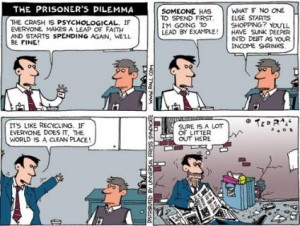‘But Everybody’s Doing It!’
When you were a you kid you probably said to your parents at one time or another ‘But everybody’s doing it.’ You probably never realized how often you did something because of the people surrounding you. Everyone reacts and makes decisions to some extent because of what other people think and do.
Evan Sellinger discusses in the article ” ‘But Everybody’s Doing It!’ Lance Armstrong and the Philosophy of Making Bad Decisions” that people must choose between the moral options, which are better for society, and the option that will help themselves. In sports, competition is high and athletes look for anything to get ahead in the game. Sometimes athletes will go as far as using illegal drugs. Lance Armstrong, an American road racing cyclist and cancer survivor, was recently charged by the U.S. Anti-Doping Agency for using performance enhancing drugs. This disclosure caused some outrage, as Armstrong is a hero and inspiration for many people. But Sellinger interestingly questioned if it was actually wrong. There are so many other athletes that cheat using drugs meaning Armstrong would be at a disadvantage by not doing them. In other words, everyone else was doing it so why is it wrong? He still worked very hard to accomplish all he has done and should be recognized for his achievements. Unfortunately, Armstrong was placed in a prisoner’s dilemma and followed the path most people do when facing such a decision.
A prisoner’s dilemma is when two criminals are separated and not allowed to communicate and must decide whether or not to confess to a crime. If neither confess, each gets a short jail sentence. If one confesses, but the other does not, the person who confesses is free (no jail time) and the other is subjected to a long jail sentence. If both confess, each must serve a medium jail sentence. In this case, confessing is like using drugs and not confessing is like not using drugs. The table below illustrates the prisoner’s dilemma.
Athlete 2
| Take Drugs | Doesn’t Take Drugs | |
| Take Drugs | 5, 5 | 10, -10 |
| Doesn’t Take Drugs | -10, 10 | 1, 1 |
Athlete 1
The rows represent athlete 1’s decision and the columns represent athlete 2’s decision. The first number in each box is athlete 1’s payoff and the second is athlete 2’s payoff. The higher the payoff, the more it benefits the specific athlete and gives them a better chance in winning an athletic competition. (Note: The numbers are not an exact science, I just made them up to explain the scenario.) Both athlete’s dominant strategies are to take drugs because no matter what the other athlete does, it is more advantageous for said athlete to take drugs. Therefore, the Nash equilibrium, which is the box that the situation will naturally end up in, occurs where both athletes take drugs.
The prisoner’s dilemma says that people will confess/use drugs because if you don’t there is a chance of a longer jail sentence, or not winning a sports competition. As stated in the article,
“A significant divide separates the two — one big enough to make the honest competitor looks like a sucker who fails to grasp the incentives and expected values associated with the basic options. While the cyclist who wants to be a clean competitor can win the moral contest of clinging to high principles, he or she won’t win the Tour de France.”
Ethically, the two players should not confess/take drugs because it has the best payoffs. In reality, though, neither person trusts the other person enough and with motive, selflessly chooses a worse option, which is illegal and may have an effect on the player’s health in the future.
At the end of the article, Sellinger relates this game to sustainability through the explanation of the cartoon below. “Without realistic options for bringing about desired collective action, the game is over before it begins.”
Essentially, people need to work together for the better of society because we can’t just think about ourselves. Otherwise, we will continue to fall for the prisoner’s dilemma, which will impede us in the future.
Article Source: http://www.theatlantic.com/technology/archive/2012/08/but-everybodys-doing-it-lance-armstrong-and-the-philosophy-of-making-bad-decisions/261669/
–BigRED

